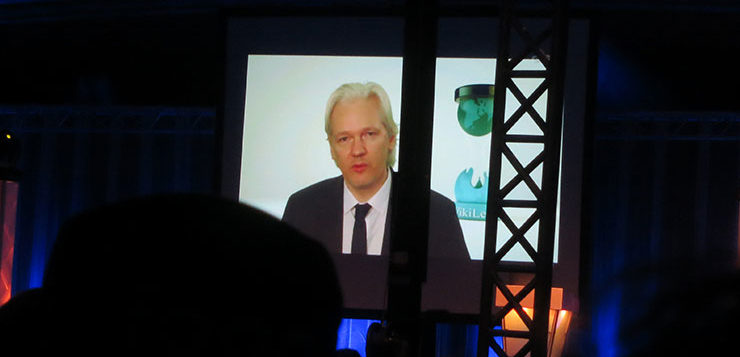DON’T MISS ANYTHING! ONE CLICK TO GET NEW MATILDA DELIVERED DIRECT TO YOUR INBOX, FREE!
Despite what you might read in the millions of stories written on Julian Assange’s alleged crimes against women, some of the people genuinely harmed by his arbitrary detention have been rape survivors. Dr Lissa Johnson explains.
On Friday 13th September, a Westminster Magistrates court ruled that Julian Assange should remain in prison indefinitely, after his sentence of imprisonment came to an end on September 22nd. The judgement is the latest instalment in a long campaign of judicial persecution, harassment and state-sanctioned abuse, as assessed by the Special Rapporteur on Torture and Other Cruel, Inhuman or Degrading Treatment or Punishment, Nils Melzer.
The ruling, according to Wikileaks, violated due process on the simple grounds that the hearing was a non-public technical hearing which did not relate to bail. The judge, it seems, issued her decision pre-emptively, before even hearing any evidence from Julian Assange’s lawyers. When the court asked Julian Assange if he understood what was going on, he replied, “Not really”.
UK MP Chris Williamson tweeted, “Britain is increasingly behaving like a tin-pot dictatorship.”
This act of judicial overreach took place against a backdrop of reports from Julian Assange’s family, friends, and the UN Rapporteur on Torture Nils Melzer, backed by assessments from specialist medical and psychiatric experts, that Julian Assange’s health is deteriorating rapidly under maximum security lockdown in Belmarsh prison, such that he could die as a result. Julian Assange is emaciated, ill and traumatised, stripped of his legal and human rights while held in solitude, suffering the effects of years of arbitrary detention and psychological torture.
BE PART OF THE SOLUTION: WE NEED YOUR HELP TO KEEP NEW MATILDA ALIVE. Click here to chip in through Paypal, or you can click here to access our GoFundMe campaign.
To add insult to injury, these abuses are being inflicted based on disingenuous legal concoctions surrounding the already disingenuous Swedish investigation that gave rise to his imprisonment. The bail infringement charge associated with the Swedish investigation, for which Julian Assange was initially imprisoned in Belmarsh, is itself illegal under international law. It was issued in the context of political asylum, which renders the bail infringement null and void.
In other words, the UK government has been locking Julian Assange up illegally. Which makes the recent decision to extend his incarceration even more alarming, in terms of its wider implications for the rule of law and the right to a fair trial.
Rather than take Julian Assange’s asylum into account, or describe the background to the disgraceful state of legal affairs imposed upon him, the Westminster judge instead cast Julian Assange’s history of political asylum as “absconding”. Such was her justification for condemning him to indefinite incarceration, with all the potentially lethal consequences that ongoing detention entails.
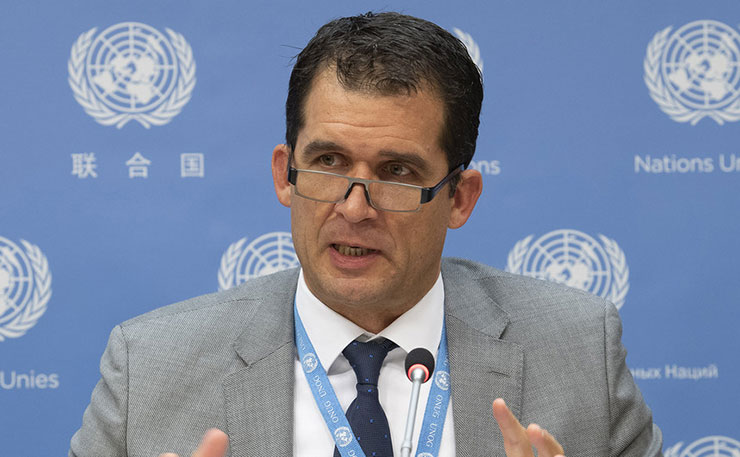
Either the judge doesn’t know the background to Julian Assange’s case, or she chose to ignore the fact that Julian did not ‘abscond’ from Sweden at any time. Julian Assange was granted permission to leave Sweden in 2010. He always offered to return if Sweden would guarantee protection from onward US extradition. Sweden always refused.
Like every turn in the Swedish investigation, this latest development is built upon years of misleading and counterfactual public narratives. It serves not only to help deliver Julian Assange into US hands, but to break him psychologically and physically and tar him with baseless smears, as Nils Melzer has detailed.
The truth is that Sweden has not even charged Julian Assange with anything from which he could abscond. The legal threat hanging over Julian Assange is, and has always been, US retribution for exposing state-corporate crime. Sweden can’t even make up its mind whether it has enough material to keep its investigation alive, after all these years.
Earlier this month, Sweden’s Deputy Director of Public Prosecutions, Eva-Marie Persson, announced that she had re-interviewed several witnesses from 2010. Why? Persson said that the interviews would help her “decide how to proceed with the case”. That is, whether to close it or whether to continue conducting further enquiries.
Nine years on, with the matter still in the initial investigation stage, prosecutors aren’t even sure whether they have grounds for further enquiries, let alone a case, doubling back to square one to start again, trying to scratch up reasons to persist.

This is the paper-thin legal pretext for locking Julian Assange in Belmarsh Supermax and torturing him within an inch of his life. It is as threadbare now as it has always been.
Given that the stakes involved are a human being’s life and liberty, all of our freedom of speech, and rule of law, the moral elasticity of well-intentioned and well-informed citizens looking on is growing increasingly strained. The confected sugar-coating of ‘Swedish justice’ is wearing transparently thin, giving way to the bitter reality of a brutal political persecution.
On July 28th, Women Against Rape wrote, “Once again women’s fury and frustration at the injustices we face is being manipulated by governments for their own purposes… We cannot condone the way rape allegations against an individual continue to be used to pursue a political agenda intent on hiding rape, torture and murder committed by the state.”
Abuse
The question any self-respecting onlooker must be asking right now is not ‘will Julian Assange abscond?’ or ‘what else can Swedish prosecutors dig up?’. It is ‘does Julian Assange deserve to die in jail while Swedish prosecutors dither like no prosecutors have dithered before, so that war criminals can get away with murder?’
Similarly, in response to the latest travesty of justice in a UK court, the pressing question is, ‘why have the litany of legal travesties in Sweden and the UK gone un-investigated since 2010?’
The fact is that Julian Assange was sentenced to 50 weeks in Britain’s Guantanamo, alongside convicted murderers, based on not only a legally null and void bail infringement, but a bail infringement attached to an investigation whose sole piece of physical evidence against him was an unused condom.
Julian Assange must be the only man in Britain under maximum security lockdown based on the ‘evidence’ of an unused condom. If not, we’re all in trouble. If so, we’re all still in trouble.
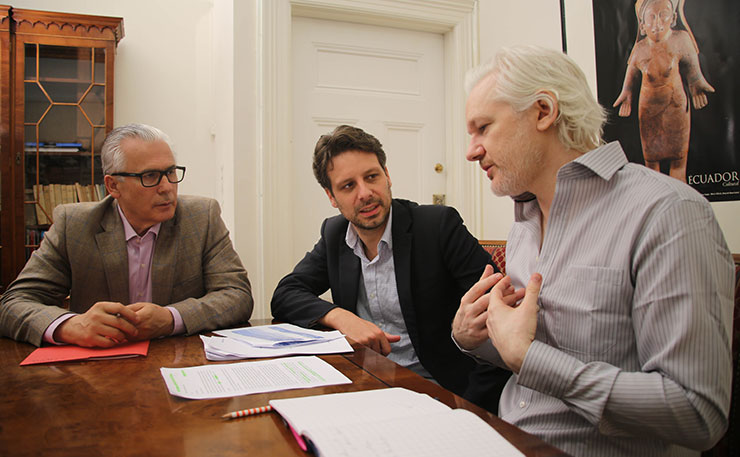
The question is not ‘should Julian Assange remain in jail?’ It is ‘why did a court ever accept as evidence something so clearly counterfeit as a condom that no-one had ever worn, laying the groundwork for the inhuman ‘bail-skipping’ and ‘absconding’ punishments that Julian faces now? How could an international arrest warrant have ever been issued on that basis? Why wasn’t someone somewhere grilled over faking evidence?’
And why persist for nine years with an investigation whose only other key piece of ‘evidence’ is an unsigned, unendorsed statement from a woman who insisted that she had not been raped, that she felt “rail-roaded” by police and that the police had “made up” the allegations?
A likely answer, of course, is that in 2010 Julian Assange was the subject of a multi-agency US manhunt, stemming from his publishing activities, which had exposed prima facie evidence of US war crimes in Iraq and Afghanistan. From the point of view of that manhunt, a Swedish arrest would have been a windfall gain. Just as the latest UK judgement has been.
Among US allies, Sweden is noteworthy for its bilateral treaty with the United States, enabling fast track US extradition, known as ‘temporary surrender’. Sweden also has a history of rendering suspects to the US at the CIA’s request, culminating in the suspects’ torture. In fact, UN committees have warned of Sweden’s “total surrender of power” to US authorities.
That total surrender of power offers at least one hypothesis as to why the Swedish investigation has been so riddled with damning legal irregularities and improprieties that the former Secretary General of the Swedish Bar Association described the legal conduct of both Sweden and the UK as “deplorable”, noting that she fears that the investigation has damaged the reputation of the Swedish judicial system.
Since Julian Assange’s arrest in London and imprisonment in Belmarsh prison, the UK judicial system has followed right along behind.
UN Rapporteur on Torture Nils Melzer adds that the conflagration of legal aberrations amounts to “a relentless campaign of judicial persecution… [involving]abuse of the judicial system in order to try to extradite [Julian Assange] to the US”.
Stockholm’s former Chief District Prosecutor and Director of the Stockholm Regional Prosecution Authority, along with a retired judge from the Svea Court of Appeals, have similarly denounced the longstanding impropriety of Sweden’s legal and prosecutorial conduct regarding Julian Assange.
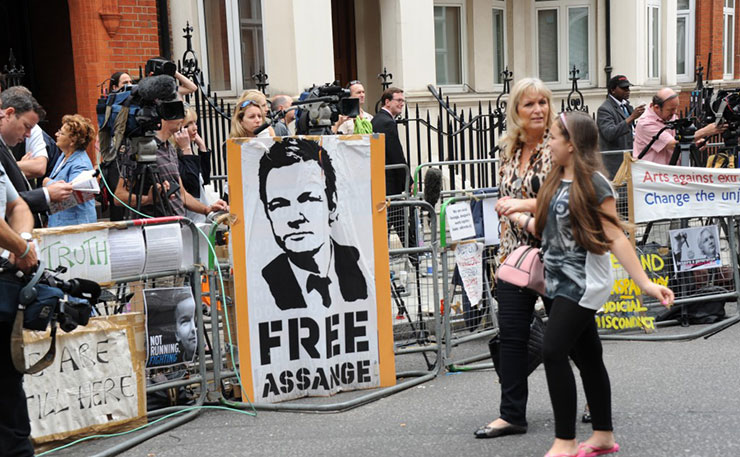
In short, the Swedish investigation itself, and everything emanating from it, including Julian Assange’s current incarceration, is an abuse. It is an abuse of power, of political process, of legal process, and of the public emotions and experiences surrounding rape and sexual assault.
Ultimately, it is an abuse of rape survivors themselves. It is survivors’ trauma, pain and plight that has been exploited for political gain, using manufactured crimes in Sweden to provide cover for the actual crimes that Julian Assange exposed, including torture and civilian slaughter.
The decision to arbitrarily extend Julian Assange’s sentence in Belmarsh sits atop that legacy of abuse by reaping the fruits of an endeavour that has weaponised rape myths, and the issue of sexual consent, in order to criminalise journalism at the expense of rape survivors.
In its reliance on an unused condom, the Swedish investigation and UK imprisonment are founded upon not just bogus evidence but dangerous fodder for toxic rape myths: namely that women will fabricate evidence such as unused condoms in order to cry rape. It is the last thing that rape survivors need. Victims and survivors need to be believed and taken seriously.
Moreover, to get behind the Swedish investigation, and all that it has spawned, is to stand upon ground over which women’s consent, the cornerstone of progressive rape laws, has been well and truly trampled.
In light of the British courts’ determination to use a bogus ‘rape’ investigation to lock a journalist in jail and throw away the key, it is time for those who know what is going on to set the record straight about the Swedish matter, and all its implications. Women deserve to be angry that so much travesty has been perpetrated in their name. And men alongside them.
BE PART OF THE SOLUTION: WE NEED YOUR HELP TO KEEP NEW MATILDA ALIVE. Click here to chip in through Paypal, or you can click here to access our GoFundMe campaign.
Many well-intentioned people are frightened to question the validity of the Swedish investigation, and Julian Assange’s imprisonment, for fear of being deemed insensitive to women and sexual assault victims, or appearing anti-feminist. However, there is nothing anti-feminist nor anti-women about calling the Swedish investigation out for the duplicitous and misogynistic abomination that it is.
Here’s why.
Who cares about your consent?
In recent times, academics and practitioners have worked hard to bring official understandings of rape and sexual assault into closer alignment with survivors’ real-world experiences, including recognising nonviolent forms of sexual assault, and shifting the burden of prevention from victims to perpetrators.
Bringing the issue of sexual consent front and centre has played a key role in that endeavour.
Disagreement exists as to how best to categorise consent, for instance as verbal, non-verbal, internal, external, behavioural, moral, legal, affirmative, positive or constrained. However, an underlying consensus has broadly been reached in which, as Professor of international law Nils Melzer notes, “consent can be conditional (e.g. on the use of a condom) and can be withdrawn at any moment”.
In the matter of Julian Assange vs the Swedish Prosecution Authority, however, this evolving legal landscape, with gaps between academic, legal and public understandings of rape and sexual assault, has provided wide open spaces in which to play political football with the truth.
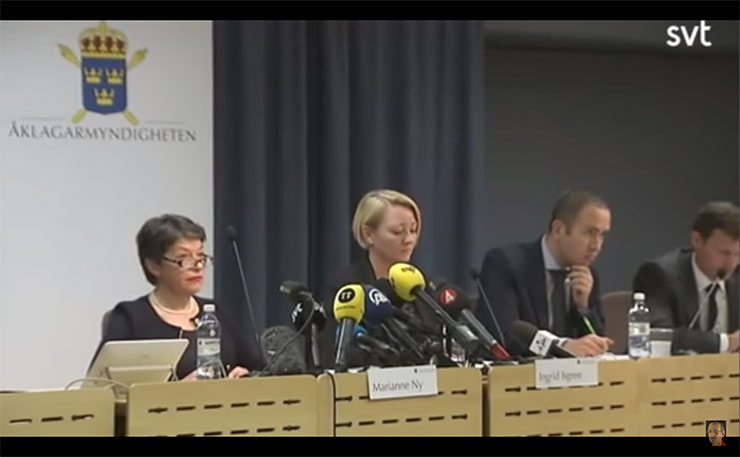
Specifically, those who decry the ‘rape’ allegation are accused of minimising the importance of consent, trivialising the seriousness of non-consensual encounters, and are branded rape apologists, anti-feminist or anti-women.
In reality, however, the opposite is the case. It is the Swedish authorities who brushed the issue of sexual consent aside. In 2010, Swedish police and prosecutors were under no legal obligation whatsoever to take a woman’s consent into account when filing an offense of ‘rape’. At that time, Swedish law had not yet adopted a consent-based definition of rape and sexual assault.
As a result, authorities were at liberty to issue an arrest warrant for Julian Asssange whether or not the woman involved had consented, either to sex or to the arrest warrant.
The truth is that the Swedish investigation began when Swedish authorities, not women, publicly accused Julian Assange via the tabloid press, behind the back of the woman involved.
The woman, SW, not only wrote in text messages that “the police made up” the allegations, she became so distressed when she learned of the arrest warrant against Julian Assange that her police interview had to be discontinued, and she declined to sign the record of her interview. SW texted that she “did not want to accuse Julian Assange for anything”.
If not consent, then how did authorities define the offense of rape in order to accuse Julian Assange?
To understand this, it is necessary to first understand some of the facts of the matter, and the ways in which those facts have been misrepresented in the public domain. It is these misrepresentations upon which ever graver abuses, such as condemning Julian Assange to a life in prison, depend.
It’s not about you
On August 20th 2010, a worried young woman, known as SW, attended a Stockholm police station to enquire about compelling Julian Assange to take a sexual health test. SW had met Julian Assange at a seminar in Stockholm, and they had engaged in unprotected sex during the following days.
Afterwards, upon SW expressing her concerns about Sexually Transmitted Diseases (STDs), Julian Assange agreed to take an STD test the next day, when his schedule permitted. The young woman, however, wished to know sooner rather than later, and remained concerned.
SW discussed her fears with a second woman, AA, a seminar organiser. The women decided to visit the police to enquire whether SW could compel Julian Assange to take an STD test. Together they went to see a friend and associate of AA’s at a Stockholm police station, officer Irmeli Krans. AA and Krans were both political candidates in the same political party. Officer Krans let her political colleague AA sit in on the interview with SW.
During SW’s interview, it came to light that the unprotected sex had taken place while SW was dozing off after intercourse in the morning. Julian Assange awoke her by initiating sex. According to her police statement SW said, “You better not have HIV” to which Julian Assange replied, “of course not”, and she “let him continue”.
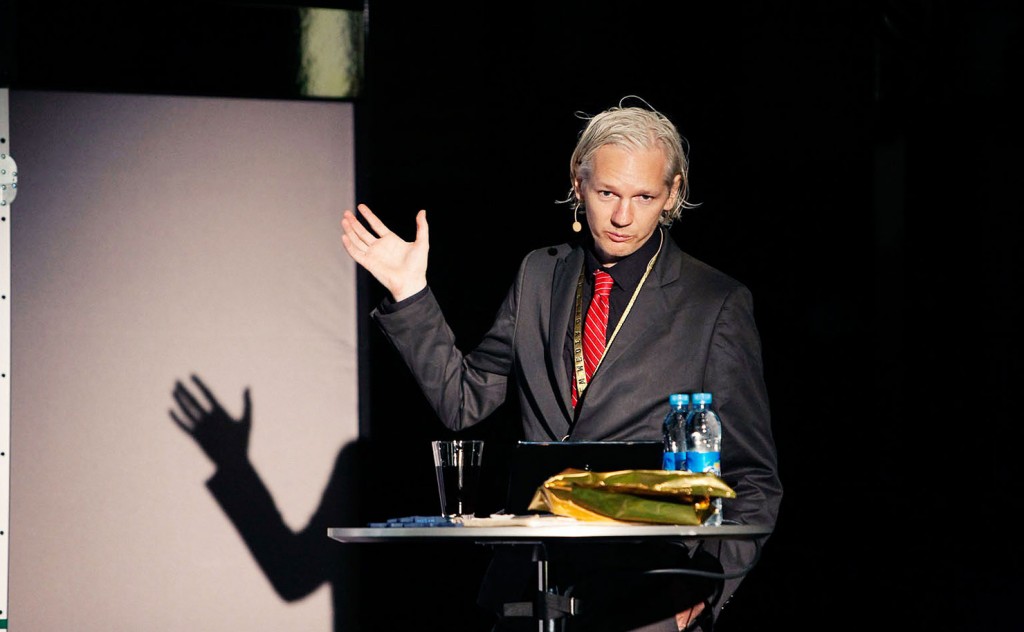
Based on this information, the on-call prosecutor immediately issued an arrest warrant for Julian Assange, under an offence of ‘rape’. At the time of the arrest warrant police were just 40 minutes into SW’s two-and-a-half hour interview.
The news was promptly and illegally leaked from the police station to a right-wing tabloid newspaper, Expressen, with the participation of the on-duty prosecutor. The following morning Expressen’s front page blazed, “Julian Assange HUNTED suspected of RAPE IN SWEDEN”, spreading like wildfire around the world. The headlines reached Julian Assange, which was how he learned of the accusations against him.
That pattern was to continue throughout the following weeks of the investigation, with partial information from police interviews and prosecutors’ files leaked to the press, against Swedish anonymity laws, seeding the public narrative that has persisted ever since.
Among the details omitted from that narrative were the contents of SW’s text messages describing her own feelings and experiences. SW had texted that she was “shocked” by the rape allegation and that she “only wanted [Assange] to take a test”.
If SW denied being raped and was shocked by the accusation, on what grounds did authorities file the arrest warrant?
On the grounds that SW had used the words “half asleep” to describe her state at the time of intercourse, it being after breakfast and she being sleepy. Although Swedish authorities were not required to take SW’s wishes or intentions into account, Swedish law did make provisions for an offence of “minor rape”, which included improperly exploiting someone while in a “helpless state”, such as “sleep”.
Under this definition, the leeway to construe SWs account as a crime using the term “half asleep” was all that the authorities were interested in. They were not interested in SW’s consent, subjective, behavioural or otherwise, whether during sex or with respect to the rape allegation.
As SW said in text messages, Julian Assange was accused of rape because “the police were keen on getting their hands on him”. In other words, it was about them, not her.
In all that has flowed from events on that day, it has been the authorities, not the woman, whose agenda has been pursued. To be complicit with that agenda, whether tacitly or overtly, is to tell survivors of rape and sexual assault, “it’s not about you”.
The authorities’ agenda, what’s more, has been one in which a woman is not entitled to tell her story in her own words, nor to use her own voice. Contrary to procedure and police guidelines, SW’s interviewing officers declined to record their interview with her. One of her interviewing officers reportedly even altered the police record of her interview, on orders from her superior.
According to the Nordic News Network, emails reveal that the Monday after the Friday interview, the lead investigator in the matter instructed interviewing officer Krans to “Write a new protocol [i.e. police version of the interview]. Add the changes and assign the protocol to the case. And sign the protocol…It would look odd if I were to sign it.”
BE PART OF THE SOLUTION: WE NEED YOUR HELP TO KEEP NEW MATILDA ALIVE. Click here to chip in through Paypal, or you can click here to access our GoFundMe campaign.
Barely two days in and the investigation’s irregularities were already beginning to mount: police had interviewed two women at once; by a friend and political associate of one of the women; they had leaked the news of the arrest warrant to the tabloid press; failed to record the interview; and allegedly altered the police record of the woman’s account.
Before too much damage had been done, however, the day after SW and AA’s visit to police, Stockholm’s Chief Prosecutor Eva Finne cancelled the arrest warrant. Upon reviewing the file Finne concluded that there was no evidence of rape. A few days later, on August 25th she closed SW’s file altogether, on the grounds that the conduct described by SW “disclosed no crime at all”.
An unused condom
But what of AA, the second woman at the centre of the Swedish investigation? Although SW’s allegation was closed on August 25th, an offence had also been filed for AA based on a comment she made during SW’s interview. Police followed up with a telephone interview (against police guidelines) and the matter remained open under an offence of ‘molestation’, for further investigation.
Surely there must have been more substance to AA’s claims. This time the woman herself was in agreement with authorities, together alleging that Julian Assange had deliberately torn a condom during intercourse with AA.
AA said that she had not seen Julian Assange break the condom, but she tendered a broken condom as evidence. Importantly, AA claimed that the condom she submitted was the one that Julian Assange had worn.
Analysis by the national crime lab, however, revealed no traces of DNA on the condom, whether from Julian Assange or AA or anyone else. In other words it was “a new condom that had been submitted as evidence against [Julian Assange]” Nils Melzer explains.
It cannot be over-emphasised how damaging to women and survivors of sexual assault it is to frame a man using bogus evidence such as this. For authorities to publicly and aggressively push a sexual molestation narrative based on fabricated evidence undermines the credibility of all women who seek to report sexual assault and rape.
Outside of politicised investigations, it is extremely rare for women to engage in this kind of behaviour. The majority of rape and sexual assault goes unreported.
What role authorities played in driving the tendering of an unused condom we will probably never know, given that police failed to record their interviews with AA, just as they had failed to record their interview with SW.
We do know, however, that the US government had urged its allies to file criminal charges against Julian Assange just a few weeks earlier.

Moreover, even after the tendered condom was found to be void of DNA, it was used successfully by Sweden to make a case for a European Arrest Warrant. The court took the unused condom as evidence that Julian Assange had “consummated unprotected sexual intercourse without [AA’s] knowledge”.
That European Arrest Warrant, in turn, was used to make a case for Swedish extradition, forcing Julian Assange to seek asylum in the Ecuadorian Embassy, for fear of onward extradition to the United States from Sweden. In addition to the whole-of-government operation and NSA manhunting target list, as early as October 2010 the CIA had refused to confirm or deny whether it was planning to assassinate Julian Assange.
By 2011 internal emails from the private security firm Stratfor, working with US agencies, said, “Assange is going to make a nice bride in prison. Screw the terrorist. He’ll be eating cat food forever”, adding, “[Assange] is a peacenik. He needs his head dunked in a full toilet bowl at Gitmo.”
Because Julian Assange’s asylum from such prospects prevented him travelling to Sweden, a bail infringement warrant was issued in violation of international law, over which Julian Assange now languishes within an inch of his life in Belmarsh Supermax. And a Westminster judge has summed it all up as “absconding”.
So much for British justice.
Politicised exploitation of rape myths
Remarkably, the list of legal travesties and scandals in the Swedish investigation does not end there.
After prosecutor Eva Finne closed SWs case, a “prominent politician” and lawyer, Claes Borgstrom, had the investigation re-opened. Borgstrom immediately proclaimed Julian Assange guilty in the press, such that by 2011 a web search of “Assange” and “rape” reportedly generated over 35 million results.
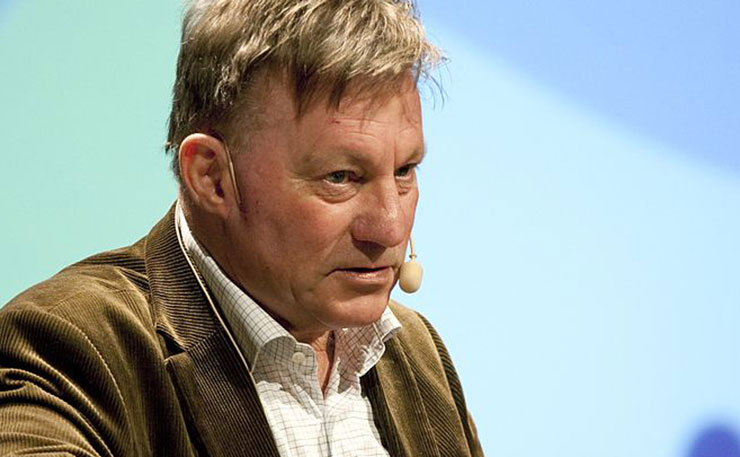
Borgstom’s business partner, curiously, was a former Justice Minister, with a history of organising CIA renditions for the United States, ending in torture.
As the investigation proceeded, Sweden prolonged the matter under pressure from the UK, including messages from the Crown Prosecution Service warning “don’t you dare get cold feet!!!” Sweden also refused to interview Julian Assange in London despite conducting 44 similar interviews abroad during the same period.
Key emails between the UK, Sweden and the US were also destroyed, along with other improprieties too numerous to detail here.
Suffice to say that Stockholm’s former Chief District Prosecutor and Director of the Stockholm Regional Prosecution Authority issued an official statement stressing that the conduct of the Swedish investigation had been “completely against proper procedure and in violation of the Swedish law and rules regarding preliminary investigations”.
A retired judge from the Svea Court of Appeals, which issues European Arrest Warrants (EAW), also criticised the EAW against Assange as “entirely disproportionate”, identifying underlying “prosecutorial misconduct”.
All of which had served, as Nils Melzer emphasises, to “try to extradite [Julian Assange] to the US”, where he now faces Espionage Act charges for reporting on serious crimes involving tens of thousands of civilian deaths.
Paradoxically, rape itself is among those very crimes. In war, women and children are raped en-masse with impunity. To persecute those exposing such crimes is to turn our backs on women raped in war, which only compounds the travesty of authorities exploiting rape to get away with murder, now with the assistance of the UK courts.
Women Against Rape asks, “Where is the campaign demanding justice for the rapes and murders Wikileaks exposed? Who will speak up for these victims if whistle-blowers are silenced?”
Nils Melzer adds, “When you prosecute a whistleblower and a journalist for exposing war crimes and corruption, you have to be very careful, because if you don’t prosecute the war crimes, then clearly you don’t have equality before the law… then prosecution becomes persecution.”
Which is what the Swedish investigation, and the latest UK judgement, are all about.
BE PART OF THE SOLUTION: WE NEED YOUR HELP TO KEEP NEW MATILDA ALIVE. Click here to chip in through Paypal, or you can click here to access our GoFundMe campaign.
Donate To New Matilda
New Matilda is a small, independent media outlet. We survive through reader contributions, and never losing a lawsuit. If you got something from this article, giving something back helps us to continue speaking truth to power. Every little bit counts.

